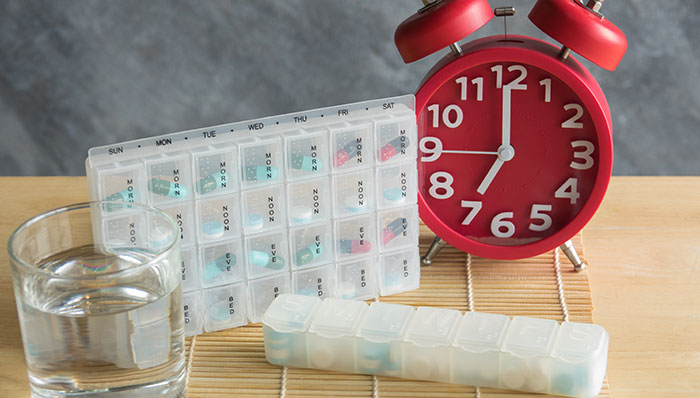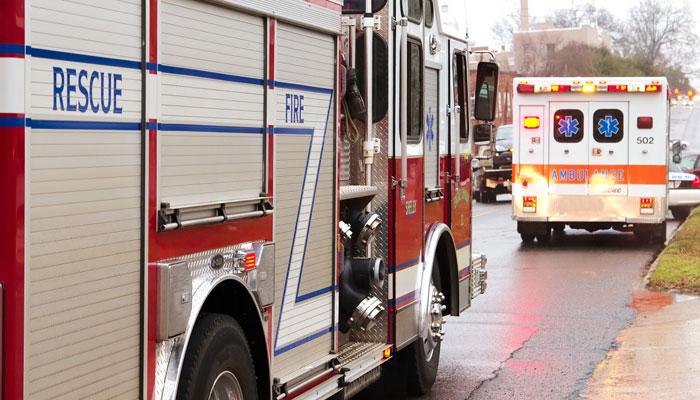Hospitals are wonderful when you need them. There is no doubt, however, that it’s better to stay healthy to begin with. No matter the skill of doctors and nurses, a health crisis is difficult. It’s hard for older adults to bounce back. And many never quite bounce back to where they were before they were hospitalized.
Of the top ten reasons for hospitalization, chronic conditions are at the root of most of them: Heart disease, diabetes, chronic obstructive pulmonary disease, and chronic kidney disease. Managing them well—following the doctor’s recommendations—is one way the person you care for can stay healthy and independent for as long as possible.
And if a hospitalization has occurred, increasing the chance of a stable recovery is a great way to avoid the setback of a rehospitalization (also called “readmission”).
Here are ways to help your relative manage their health conditions effectively:
Stay abreast of the medication schedule

Help your family member organize their medications so it’s easy to take the right ones at the right time. (See our article about managing medications.)
Bring the medications—including herbs, supplements, and over the counter remedies—to each doctor’s visit and make sure they are all still pertinent.
If a change in medication is advised, find out how that affects the others. Are there any conflicts? Are there any existing prescriptions that can or should be dropped? When should the new medicine be taken? How long should it be taken? Any side effects?
Because medications change frequently, come up with a way to easily know/look up the most current schedule.
What method do you use to track medications? How do you keep the list up to date?
Return to top
Understand your loved one's condition
Once a diagnosis has been made, find out more about the illness. Ask the doctor to explain it so you understand what parts of the body are having trouble and why. If there are terms you don’t understand, ask for clarification. You can also look up your loved one’s condition on Medline Plus for seniors. This website is published by the National Library of Medicine. It has large type and is written in easy-to-understand language. You might also wish to look at our article about educating yourself.
Do you have questions about your loved one’s condition? What resources might you consult to help you find answers? The doctor? The discharge planner? The Internet?
Return to top
Understand your loved one's condition
Once a diagnosis has been made, find out more about the illness. Ask the doctor to explain it so you understand what parts of the body are having trouble and why. If there are terms you don’t understand, ask for clarification. You can also look up your loved one’s condition on Medline Plus for seniors. This website is published by the National Library of Medicine. It has large type and is written in easy-to-understand language. You might also wish to look at our article about educating yourself.
Do you have questions about your loved one’s condition? What resources might you consult to help you find answers? The doctor? The discharge planner? The Internet?
Return to top
Know the cautionary signs

If your relative has been in the hospital, the hope is that they can make a full recovery and pick up back where they were. Getting discharged to home is a first great step. It doesn’t mean, however, they are totally recovered. Rehospitalizations are unfortunately very common. Up to 23% of Medicare patients get readmitted within thirty days of discharge.
While your family member is still in the hospital, find out what doctor(s) they should see afterward for follow-up. Their primary care? Their cardiologist? Their lung doctor? Request that the hospital forward records of the hospital stay to all of them.
Before leaving the hospital, call the doctor’s office to set up an appointment for the following week. You may need to be firm with the doctor’s receptionist. Explain that the person you care for has just been hospitalized and they need to have a follow-up appointment to be sure they are recovering as expected. Ideally, the doctor will do an exam and also review any medication changes or therapy recommendations made by the hospital doctors. They can then make adjustments based on their understanding of your relative’s medical history and how well the recovery seems to be going.
Which doctor is the most appropriate to see for a follow-up? The primary care physician? A specialist?
Return to top
Support lifestyle changes
 Many chronic conditions improve dramatically with changes in diet or exercise. Stopping smoking is one of the bigger lifestyle changes that can improve health and keep your loved one out of the hospital. But these changes are not easy. And nagging will only build resentment. In the spirit of collaboration, however, you can still support your loved one to make what changes he or she can. Even little steps add up. Consider reading our article about supporting a family member to change in “Your Changing Role.”
Many chronic conditions improve dramatically with changes in diet or exercise. Stopping smoking is one of the bigger lifestyle changes that can improve health and keep your loved one out of the hospital. But these changes are not easy. And nagging will only build resentment. In the spirit of collaboration, however, you can still support your loved one to make what changes he or she can. Even little steps add up. Consider reading our article about supporting a family member to change in “Your Changing Role.”
Return to top
Address common sources of injury

Falls and car accidents. Injury is a common cause of hospitalization for older adults, in particular, falls and automobile accidents. See our articles about preventing falls and driving safely.
Medications. Problems with medications frequently result in a fall and therefore injury. Taking too many pills, not the right ones, or taking them in the wrong combination can cause your family member to feel dizzy and lose balance. Helping the person you care for to manage medications well is a great way to reduce the risk of injury and hospitalization.
Burns. Burns are an unexpected source of injury for older adults, but they are in fact the second leading cause of injury death for those over sixty-five.
Older adults have thinner skin, so they get burned easily and do not recover as readily. They also have reduced sensitivity, which can cause them not to react quickly when there is a problem. As a result, they are exposed to the heat for longer and sustain a more serious burn.
Burns can come from house fires—nearly half of which start in the kitchen—or from scalding water or oil. (All it takes is three seconds of exposure to water that is 140° to cause a burn serious enough to require surgery.)
Ways to prevent burns
- Install smoke and carbon monoxide detectors. Replace batteries regularly.
- Set water heaters to no higher than 120° (a bit lower than the medium setting).
- Keep a fire extinguisher in the kitchen.
- Have an escape plan, with alternate routes in case of a fire.
- Never leave the kitchen when frying, boiling, grilling, or broiling food.
- Turn pot handles so they face the back of the stove.
- Wear short-sleeved shirts or close-fitting sleeves when cooking.
Have falls been a problem in the past? Do you have concerns about your relative’s driving? Are there precautions you can take about burns?
Return to top




 Many chronic conditions improve dramatically with changes in diet or exercise. Stopping smoking is one of the bigger lifestyle changes that can improve health and keep your loved one out of the hospital. But these changes are not easy. And nagging will only build resentment. In the spirit of collaboration, however, you can still support your loved one to make what changes he or she can. Even little steps add up. Consider reading our article about supporting a family member to change in
Many chronic conditions improve dramatically with changes in diet or exercise. Stopping smoking is one of the bigger lifestyle changes that can improve health and keep your loved one out of the hospital. But these changes are not easy. And nagging will only build resentment. In the spirit of collaboration, however, you can still support your loved one to make what changes he or she can. Even little steps add up. Consider reading our article about supporting a family member to change in 